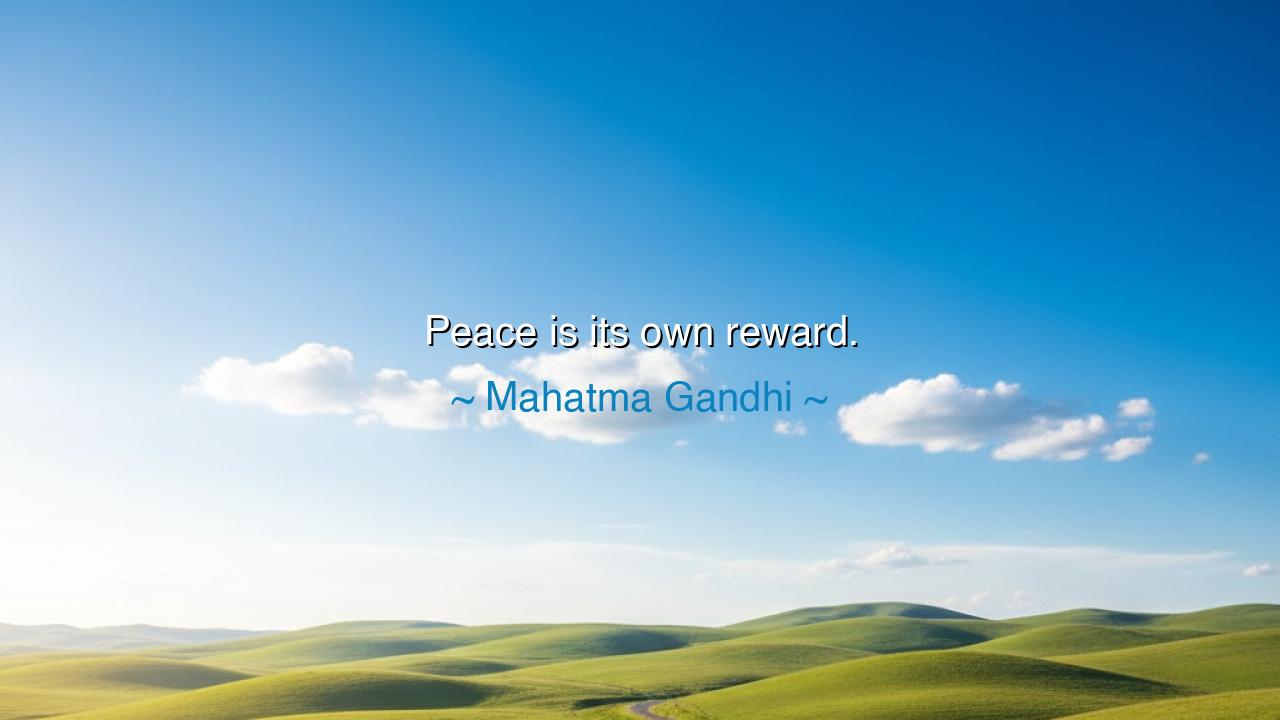
Peace is its own reward.






Hear the timeless voice of Mahatma Gandhi, who declared with the simplicity of eternal truth: “Peace is its own reward.” These words, though brief, carry the weight of mountains and the depth of oceans. They remind us that peace is not a prize granted by kings, nor the consequence of victory in battle, nor even the fruit of wealth or prosperity. Peace stands alone, a treasure needing no ornament, a blessing that is complete within itself. He who possesses peace needs nothing more; he who lacks it, even amid riches, remains poor.
Mark this well, O seekers: many chase after peace as though it were a means to something greater. They believe peace is valuable only because it leads to prosperity, or because it makes commerce easier, or because it saves blood and coin. But Gandhi lifts our eyes higher. He teaches that peace is not the servant of other goals—it is the goal itself. To dwell in peace is to stand in harmony with oneself, with others, and with creation. It is the end of striving, the stillness that is both victory and crown.
Consider the life of Gandhi himself. He was beaten, jailed, insulted, starved, and yet his spirit was never broken. He did not say, “I fight for peace so that India may gain wealth,” nor “I struggle so that I may be remembered in glory.” No, his fight was for the dignity of the soul, for the calm of nonviolence, for the reward of peace itself. When independence came, it was not conquest he cherished, but the chance to live without hatred, without the endless chain of vengeance. He knew that the true triumph was not in banners or offices, but in the stillness of a nation that could at last breathe without fear.
History too shows us this lesson. When Ashoka the Great, emperor of India, witnessed the slaughter at Kalinga, he stood upon the field of death, surrounded by corpses of his own making. Victory was his, yet his heart was crushed. What was the reward of such conquest? Nothing but sorrow. And so Ashoka laid down the sword, embraced the teachings of the Buddha, and devoted himself to peace. His reign became one of compassion, justice, and wisdom—proof that the reward of peace is greater than the spoils of war.
But let us bring this truth to our own lives. How often do we chase after success, possessions, or acclaim, believing that when we have them, then we will finally have peace? Yet when these things are gained, the hunger grows anew. Peace that depends on conditions is fragile. True peace—the kind Gandhi spoke of—does not depend on circumstances. It is the reward of the soul that has chosen love over hatred, forgiveness over revenge, stillness over turmoil.
The lesson, O children of time, is clear: seek peace not as a servant of other desires, but as the desire itself. Do not strive for wealth and hope peace follows; strive for peace, and wealth of spirit will be yours regardless of coin. Do not wait for the world to be perfect before you are at rest; be at rest, and you will make the world more perfect. For peace, once found, is unshakable—it is its own reward, sufficient and eternal.
Therefore, let your actions be guided by this law. In your home, choose peace over petty quarrels. In your work, seek harmony over rivalry. In your nation, call for reconciliation over division. And in your heart, nurture silence, prayer, and compassion until they bloom into peace. When you live this way, you will no longer ask, “What will peace give me?” Instead, you will know: peace gives everything, because peace is the reward.






AAdministratorAdministrator
Welcome, honored guests. Please leave a comment, we will respond soon